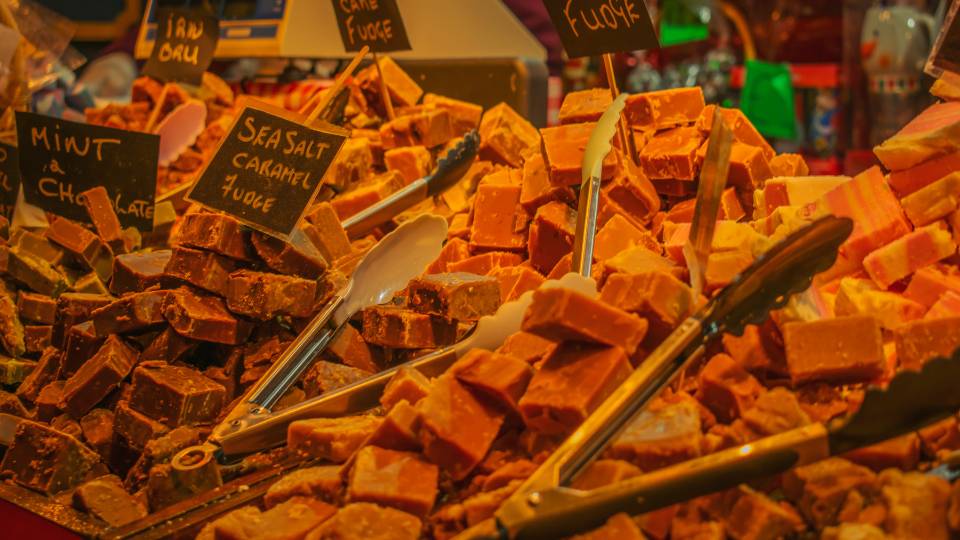
The Edinburgh Christmas Markets, renowned for their festive atmosphere, diverse stalls, and vibrant events, also present an opportunity to focus on sustainability.
Here are several strategies to help reduce waste and make the markets more eco-friendly.
Table of Contents

Current Initiatives at Edinburgh Christmas Markets
Promotion of Reusable Items
Edinburgh Christmas Markets already have begun to encourage their visitors to use reusable items in place of disposable of single-use alternatives.
Many stalls offer discounts to those who bring their own cups, containers, and bags.
One of the hot chocolate stalls offers a deposit scheme for their cups where customers put a £5 deposit down that they get back if they return their cup. That way, the stall is responsible for cleaning the cup and offering it back out to other customers!
This initiative helps reduce the reliance on single-use plastics and promotes a culture of sustainability.
Recycling Programmes at Edinburgh Christmas Markets
Recycling bins are strategically placed throughout the market areas, clearly marked for different types of waste such as paper, plastic, glass, and food.
This facilitates proper waste disposal and recycling among the thousands of visitors over the course of the Christmas Markets.
Eco-Friendly Vendors
Some vendors have adopted sustainable practices, using biodegradable packaging and eco-friendly materials for their products.
For example, the food stalls are encouraged to serve dishes in compostable containers made from plant-based materials rather than traditional plastic.
This practice not only reduces waste but also supports environmentally conscious businesses.
The gift shops and tourism stalls have been encouraged by management to use recycled paper and soy-based inks for their packaging, further reducing the environmental impact.
Sustainable Transportation
Edinburgh Christmas markets only focus on locally-produced or ethically-sourced goods.
This means that the overall environmental impact associated with long-distance transportation is massively reduced.
Not only this, but the policy supports small, local businesses that depend on the tourism of the annual Christmas market.

Areas for Improvement
Expanding the Use of Reusables
While the current promotion of reusable items is commendable, the market could expand this by implementing a concrete deposit-return system for all cups and containers used across every stall.
This system has proven successful in other European markets, incentivising the return of reusable items and reducing litter.
Enhancing Food Waste Reduction
Partnering with local charities and food banks to donate unsold food could significantly reduce food waste.
Additionally, introducing composting facilities for food scraps from vendors and visitors would help manage organic waste more sustainably.
Increasing Public Awareness
The market could increase efforts to educate visitors about waste reduction.
This could include workshops, informational signage, and interactive displays on recycling and sustainability practices.
Engaging the public in these efforts can foster a more environmentally conscious community.
Digital Innovations
Moving towards digital solutions for tickets and promotions can further reduce paper waste.
QR codes for event information and schedules can minimise the need for printed materials, contributing to a reduction in overall waste.
Energy Efficiency
Switching to energy-efficient LED lighting for decorations and stalls can reduce the market’s energy consumption.
Additionally, exploring renewable energy options, such as solar panels for powering some parts of the market, could further lower the environmental impact.
Waste Audits
Conducting regular waste audits to understand the types and quantities of waste generated can help identify areas for improvement.
This data-driven approach allows for targeted interventions to reduce waste and improve recycling rates.

Conclusion
The Edinburgh Christmas Markets are taking significant steps towards reducing waste and promoting sustainability.
However, there is always room for improvement.
By expanding reusable item programmes, enhancing food waste reduction efforts, increasing public awareness, embracing digital innovations, improving energy efficiency, and conducting better waste audits, the markets can further minimise their environmental impact.
For visitors who care about sustainability, supporting these initiatives and practising responsible waste disposal can make a big difference in ensuring that the festive magic of the markets is preserved for future generations.








